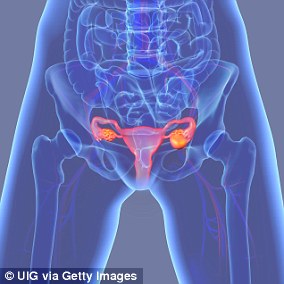Cancer-stricken woman, 68, given months to live after NHS doctors missed a 3cm tumor clearly visible on scan – and failed to properly monitor her for two years
A woman has been given just months to live after doctors missed a golf ball-sized tumor that was clearly visible on a scan. They then ignored her concerns for two years as the cancer spread.
In the previous two decades, Anne Shaw, 68, had been successfully treated for breast and ovarian cancer, putting her at greater risk of developing cancer again.
But doctors at St James’s University Hospital in Leeds failed to detect a 3.3cm tumor on her ovary during a routine scan in the summer of 2019.
And they subsequently failed to take her seriously when she returned to hospital in February 2020, complaining of symptoms of ovarian cancer and raising concerns that it may have returned.
“The officer I saw clearly had not read my medical records,” Anne said. ‘He felt my stomach area and told me I was doing well, despite what I told him about my history.’
In the previous two decades, Anne Shaw, 68, had been successfully treated for breast and ovarian cancer, putting her at greater risk of developing cancer again
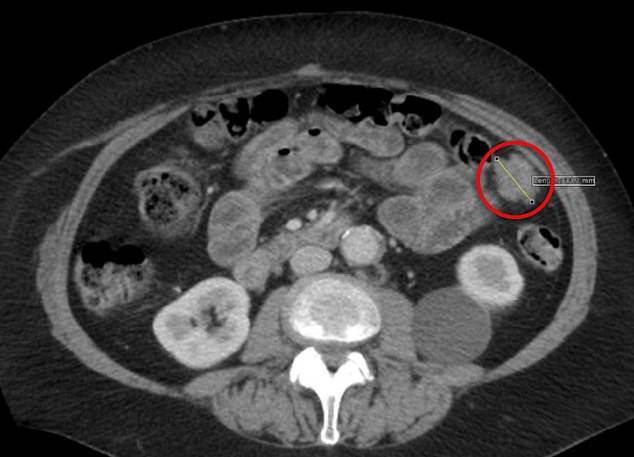
But doctors at St James’s University Hospital in Leeds failed to detect a 3.3cm tumor on her ovaries during a routine scan in the summer of 2019
It wasn’t until she went to her GP again in September 2021 that she was quickly referred to a cancer specialist and the cancer was eventually diagnosed that autumn. By then it had spread to large parts of her intestine.
“The consultant said that the hospital had a ‘duty of openness’, which meant that he had to explain that the tumor could actually be seen on the 2019 scan,” said Anne. ‘He said if they had acted at the time it probably could have been easily resolved with chemotherapy and monitoring.’
Now the former workplace trainer and assessor from Leeds is calling for cancer patients’ scans to be double-checked by two specialists to prevent others from suffering the same fate.
Because the cancer was so advanced by the time she was diagnosed, Anne had to undergo a major six-hour operation to remove a large part of her intestine and have a stoma placed.
Despite the life-changing surgery and grueling chemotherapy afterwards, doctors were unable to eliminate all the cancer and told Anne there was nothing more they could do.
She is now devastated that the remaining time she has left is marred by complications from her ostomy surgery, including pain, hernias, fatigue and a very restricted diet.
‘This has ruined what I have left of my life, it’s absolutely devastating. The fact that I’m so tired all the time and have a stoma means I can’t do a lot of things I’d like to do,” Anne said.
‘I am angry, disappointed and frustrated. I’m trying to get on with things as best I can and not think ‘what if’ all the time, but it’s very difficult.
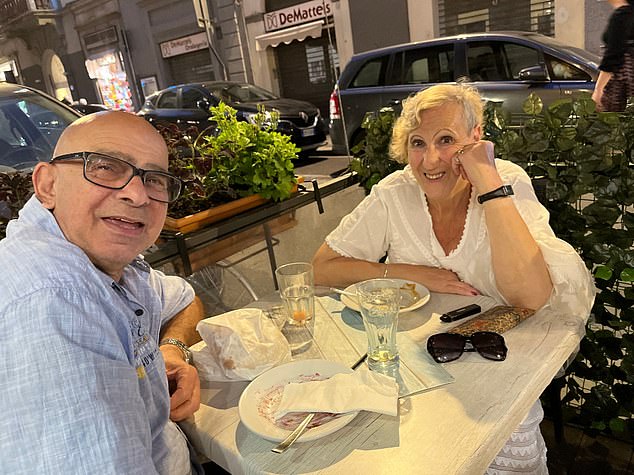
Anne said she was taking life day by day but hoped to celebrate her 25th wedding anniversary later this year with husband Louis (pictured), 74, a retired taxi driver
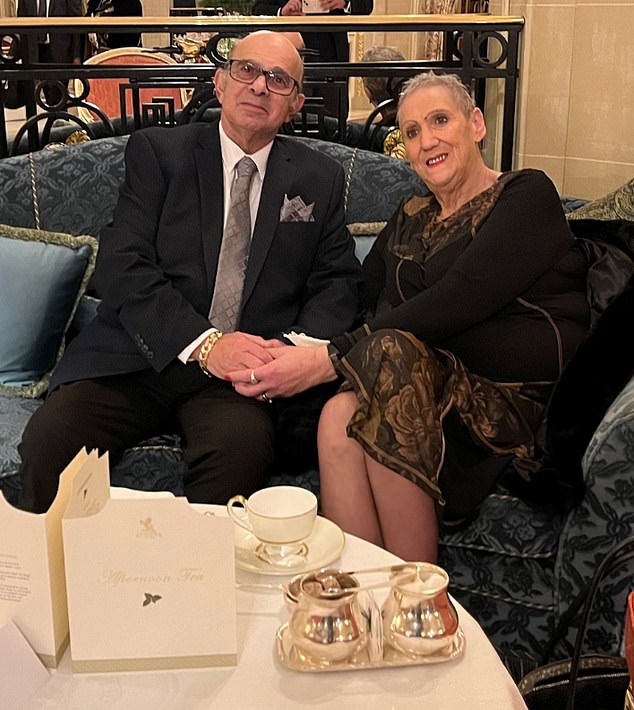
She said: ‘I just want to be treated like a human being, to feel like someone from the hospital is listening to me and cares about the impact this has had on our lives. And I want to make sure this doesn’t happen to anyone else.”
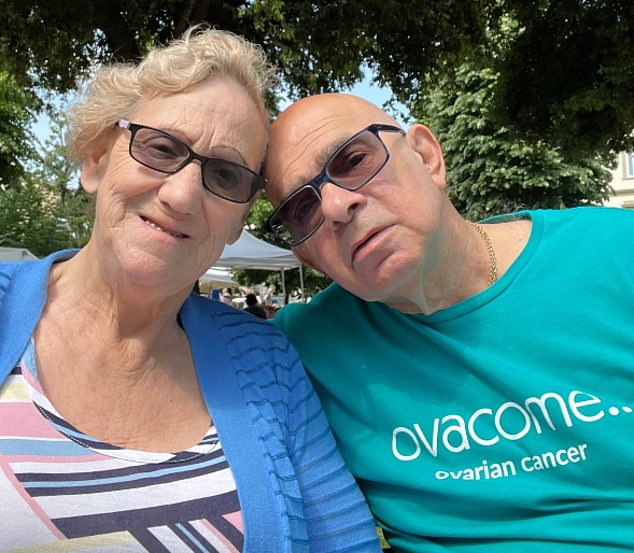
‘My whole life has changed and I’ve been through all this, but it hasn’t solved the problem. The cancer is still there and I don’t know how long I have left,” she said
‘I wonder why I went through everything I went through, when it wouldn’t have been necessary if someone had checked the scan at the time, checked my notes or listened to me.
‘My whole life has changed and I’ve been through all this, but it hasn’t solved the problem. The cancer is still there and I don’t know how long I have left.’
Anne said she was taking life day by day but hoped to celebrate her 25th wedding anniversary later this year with husband Louis, 74, a retired taxi driver.
The couple were supported by law firm Slater and Gordon to settle with the NHS Trust for a six-figure sum – a sum that Louis said ‘wouldn’t bring my wife back’.
Anne is disappointed that managers at Leeds Teaching Hospitals NHS Trust have repeatedly rejected her requests for a meeting to discuss her concerns or consider her suggestion for improvements in the way scans are assessed.
She said: ‘I just want to be treated like a human being, to feel like someone from the hospital is listening to me and cares about the impact this has had on our lives. And I want to make sure this doesn’t happen to anyone else.
‘I would like to see a change so that two radiologists have to look at scans like mine together so they can discuss and assess what they are both seeing.
‘It’s too late for me. But this could help save someone else’s life, or at least give them the time or quality of life that I don’t have.”
Clinical negligence lawyer John Lowther, of Slater and Gordon, who managed Anne’s claim against the hospital, said: ‘This is an absolutely shocking case where two opportunities to identify Anne’s cancer are missed – because she didn’t realize the cancer had returned. now has a much poorer quality of life and is understandably very concerned about living with a stoma.
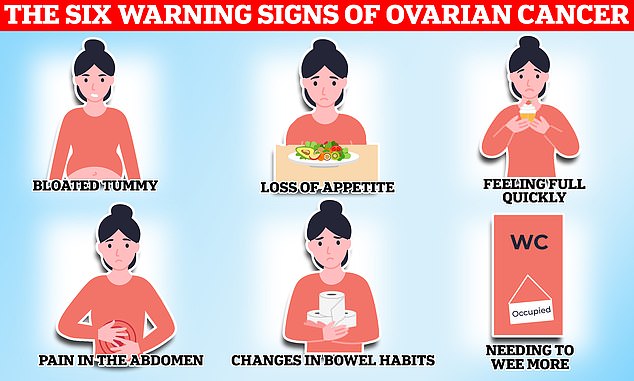
The disease kills an average of 11 women every day in Britain, or 4,000 a year. Figures show that three times as many people die from it every year in the US. When symptoms are caused by ovarian cancer, they tend to be persistent. The National Institute for Health and Care Excellence (NICE) recommends that your GP arranges tests if you experience these symptoms 12 or more times a month.
‘The last few years have been extremely difficult for Anne and Louis, and what should have been a happy retirement is now a living nightmare for both of them.’
He said the hospital must take action to ensure such “costly mistakes” are not repeated and that Anne’s suggestion to have scans checked by two radiologists made “complete sense”.
“We would support the adoption of this, not just in this particular hospital, but across the NHS,” he said.
After MailOnline approached Leeds Teaching Hospitals NHS Trust for comment, chief medical officer Dr Magnus Harrison said: ‘We are deeply sorry for the delay in diagnosing Anne’s cancer and the impact this has caused.
‘As soon as we became aware of the error, we contacted Anne and explained that we would be investigating the reporting discrepancies. This is so we can understand why and how it happened and what we can learn and improve. We shared the findings from this study with Anne and shared the lessons learned with our radiologists and radiographers.
‘We apologize that Anne’s requests to meet were not responded to. We will contact Anne as soon as possible to arrange a suitable time.’

